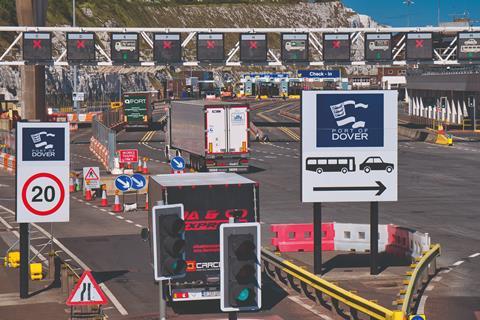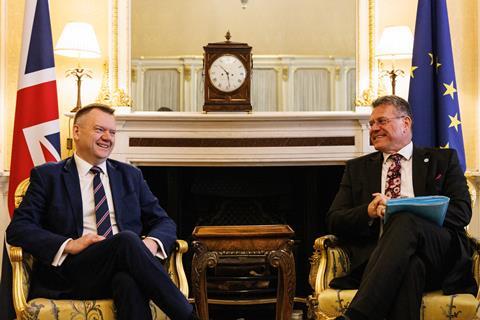Government has confirmed a new agreement with the European Union, which it said would “grow the economy” while backing British jobs.

As part of the deal, a new sanitary and phytosanitary agreement will aim to make it easier for food and drink to be imported and exported by reducing the red tape that Government said placed “burdens on businesses and led to lengthy lorry queues” at the border. This agreement will have no time limit.
Some routine checks on animal and plant products will be removed completely, allowing goods to flow freely again, including between Great Britain and Northern Ireland. Government claimed that ultimately this could lower food prices and increase choice on supermarket shelves.
The EU is the UK’s largest trading partner. After the 21% drop in exports and 7% drop in imports seen since Brexit, the UK will also be able to sell various products, such as burgers and sausages, back into the EU again.
Government said that combined with new Emissions Trading Systems linking measures, the SPS measures would add nearly £9 billion to the UK economy by 2040.
Nick Thomas Symonds, Minister for European Union Relations and lead Government negotiator, commented: “Since the start of these negotiations, we have worked for a deal to make the British people safer, more secure and more prosperous. Our new UK-EU Strategic Partnership achieves all three objectives. It delivers on jobs, bills and borders. Today is a day of delivery. Britain is back on the world stage with a Government in the service of working people.”

Industry reaction
Agriculture and Horticulture Development Board
Responding to the announcement, Sarah Baker, Agriculture and Horticulture Development Board (AHDB) head of economics, said: “Since leaving the EU, added trade friction has disproportionately impacted SME export businesses most notably with the amount of red tape creating challenges around groupage. Export Health Certificate (EHC) cost has also added an extra financial burden across the industry.
“With recent headlines highlighting trade arrangements with the US, it remains important not to overlook the EU market. The EU market is and will remain our key trading partner due to our proximity to market and established supply chains. Any agreement that lowers trade friction, smoothing trade between the UK and the EU would be good news for UK agricultural exporters.”
Ouafa Doxon, head of market access at the Agriculture and Horticulture Development Board (AHDB), reiterated the importance of the EU as one of the UK’s largest and most valuable trading partners, adding that the trade summit presented a vital opportunity to advance discussions on improving market access and addressing trade barriers that have emerged since Brexit.
“New regulatory requirements, including veterinary checks, EHCs and administrative red tape have significantly increased costs and complexity for UK meat exporters, disrupting supply chains, reducing competitiveness and constraining growth.”
“Strengthening market access will benefit UK meat exporters.”
Ouafa Doxon, AHDB
Doxon continued: “Ahead of the summit, I visited Calais Port to observe veterinary controls firsthand and engage with French veterinary officials. These discussions reinforced the importance of cooperation in addressing market access challenges and improving the flow of goods.
“Constructive dialogue at this summit could help streamline processes and explore solutions such as an SPS agreement, while respecting the UK’s regulatory autonomy. Such progress would be instrumental in facilitating smoother trade flows and ensuring long-term stability for the UK meat industry.
“Strengthening market access will benefit UK meat exporters, support food supply chain resilience, and reinforce the UK’s position as a key trading partner with the EU. We will continue to monitor the details as they emerge.”
International Meat Trade Association
A spokesperson for the International Meat Trade Association (IMTA) commented: “IMTA welcomes today’s announcement that the UK and EU will seek an SPS Agreement as it will significantly reduce barriers for trade in meat between the UK and the EU to the benefit of businesses and consumers.
“This is good news for our members trading with the EU. We look forward to further constructive discussions between the UK and EU on common areas of cooperation.
“However, we must note we have concerns that dynamic alignment of UK to EU legislation means loss of the UK’s regulatory independence, especially with regard to our rest of world imports which have benefitted from more proportionate import controls under the Border Target Operating Model (BTOM).
“At the end of the Brexit Transition Period on 31st December 2020, the EU began imposing veterinary documentary requirements and physical checks on GB exports of meat. Comparing UK exports of meat to the EU in 2019 vs 2024, we see a drop of 32% in volume. We hope that when implemented, this agreement will see this recover.”
IMTA highlighted that changes on exports to the EU saw traders facing rejections at EU borders due to paperwork issues and delays. This meant product was destroyed, and the groupage model would became “virtually unworkable”.
“Food regulation should not be wholly outsourced to the EU, it is important that the UK retains some material influence in this area.”
IMTA spokesperson
IMTA’s spokesperson said: “The lack of electronic paperwork on export to the EU causes a huge administrative burden and increases the possibility for human error and paper documents getting lost. The deal will see a helpful correction to the inability to export products such as chilled mince and sausages.
“Though the introduction of changes on import from the EU has been more staged under the BTOM, UK importers of meat from the EU have faced the same issues. Trade in both directions became massively more difficult and costly with veterinary certification costs, import checks and the additional admin of doing customs paperwork.
“We had been calling for an urgent review of the BTOM for imports from the EU and for a review of the damaging Common User Charge and so it is hoped that the agreement will see benefit for imports from the EU in this regard.
“For all of these reasons, we very much welcome that the deal will result in the vast majority of movements of animal products between GB and the EU ‘being undertaken without the certificates or controls that are currently required’. However, we await more detail on exactly what this means. This will also crucially have benefits for those companies trading with Northern Ireland.
“One of the few benefits of the BTOM, which we fear is lost with this agreement, is the ability of the UK to move quicker than the EU bloc, for instance in approving additional establishments in third countries. The UK has used its independence to reduce levels of ID and physical checks on certain rest of world imports, to take a more risk-based approach than the EU.
“We’re keen to understand what assessment Government has made on what this would mean for our relations with third countries. Food security is national security; food regulation should not be wholly outsourced to the EU, it is important that the UK retains some material influence in this area. We must understand what the reference to ‘an appropriate United Kingdom contribution to decision-shaping’ means in practice.
“We will continue to monitor developments. In a Q&A the EU has stated that on an SPS Agreement it now must propose a mandate and seek the authorisation of the Council to launch negotiations - so much is left to be decided.”

British Meat Processors Association
A spokesperson for the British Meat Processors Association stated: “The British Meat Processors Association strongly welcomes the work done by Government to deliver the kind of seamless access to Britain’s biggest, wealthiest and most strategically important export market. And it has achieved this through careful and detailed consultation with industry to fully understand the technical complexities involved in the just-in-time trade in fresh meat. This Government has managed to achieve what the previous Government promised us originally but didn’t deliver. The joint declaration, whilst in the early stages, promises to bring back all the trade that simply ceased after Brexit due to crippling red tape and tens of millions of extra costs.”
“…We have been aligned with EU rules and standards all along.”
A BMPA spokesperson
“A common misunderstanding is that an SPS agreement will mean Britain becomes a ‘rule taker’. In reality, we must comply with the rules of any of our trading partners if we want to export to them – just like America must comply with British rules if they want to send us their products. This means we have been aligned with EU rules and standards all along. The difference this new deal will make is that Britain, unlike their other third country trading partners, will benefit from true, un-fettered access to their market and massively reduced trade friction. It will boost trade and make us more competitive.
“Under the existing arrangement we have had to produce a mountain of paperwork to prove we comply, costing business a fortune but with no added value. This extra cost had to be absorbed somewhere in the supply chain, either through lower margins or higher prices, driving food price inflation and rendering UK businesses less competitive.
“We await the detail of the new EU deal, but the early signs are that it is a pragmatic agreement that will be good for British businesses and consumers alike.”
National Farmers’ Union

NFU president Tom Bradshaw said: “The Government’s ambition to make it easier for the sector to trade with our largest overseas partner is welcome. Of course, as always in trade agreements, the detail is king and we will be scrutinising the specifics of this deal as they become available in the coming weeks, and as talks continue between the UK Government and the EU.
“We have always sought a strong trading relationship with the EU which reduces friction at a time of global instability. But since 2020, farming and growing businesses have been faced with significant costs, burdensome paperwork and additional checks in order to trade with partners on the continent.
“The Government has clearly listened to these concerns. With the scope to remove Export Health Certificates and cumbersome controls at the border, this deal will deliver many benefits for agri-food exports to the EU.”
“We ask our Government to ensure any agreements made enable a thriving future for British farming.”
Tom Bradshaw, NFU
Bradshaw said: “However, there remain important questions about what is within the scope of this agreement and, where current rules and regulations do differ, if there will be any exclusions. As negotiations in this area continue, it’s vital that our Government safeguards the progress we have made in policy areas such as precision breeding to enable the farming sector to continue to move forward in sustainable, resilient and innovative food production.
“We have always argued that trade with the EU must be based on equivalency. Despite the benefits this deal brings, full dynamic alignment comes at a significant cost of committing to future EU rules, in which the UK will have little say.
“We know today’s announcement is only the start of further negotiations, and we ask our Government to ensure any agreements made enable a thriving future for British farming and underpins our nation’s food security.”
British Poultry Council

BPC chief executive, Richard Griffiths, said: “This is a much-needed move that will give our producers and consumers the confidence they deserve.
“Ambition is a strong start. Now we need momentum. Swift negotiations must deliver meaningful outcomes, allowing fresh, perishable products to move seamlessly across borders, securing trade and strengthening our food security.
“That includes the movement of goods between Great Britain and Northern Ireland. Removing barriers here is essential to avoid the delays and added costs that impact poultry meat businesses.
“We have long said an SPS agreement is the most meaningful way to reduce barriers and to unlock opportunity for British poultry meat. This new context could finally get us there. Levelling the playing field is the right move for businesses, for consumers, and for the economy. We look forward to working with Government to make it happen.”
Provision Trade Federation
Provision Trade Federation (PTF) director general Rod Addy welcomed the agreement: “As a trade association primarily representing processors and traders in the meat and dairy sectors, the Provision Trade Federation warmly welcomes the agreement to work to slash Export Health Certificates and SPS checks on agrifood. This will fix many of the trade barriers that exist between this country and its nearest and biggest customer and supplier.
“This deal is everything our members were hoping for and takes much of the cost, stress and hard work out of exports and imports to and from the EU. In particular, the lifting of checks for food shipped from Great Britain and the EU for sale solely in Northern Ireland would also simplify things for the industry. Sales of shellfish and certain areas of chilled meat would also be able to resume.
“The UK would also have the ability to retain its own rules in areas such as animal welfare and advanced technologies. And it would be able to defend its farmers better against animal diseases through better access to relevant EU intelligence on emerging risks.”
Association of Independent Meat Suppliers
Dr Jason Aldiss, AIMS executive director, said: “We have been lobbying for the last couple of years a common-sense approach to create frictionless trade at the border for both exports and imports from and to the UK, and to now have 100% paper work checks and up to 30% physical checks removed entirely for red meat, poultry and eggs is very welcome.
“The cost savings in terms of Export Health Certificates , especially on groupage loads, is significant.
“British products that were banned, such as fresh sausages and burgers, will now be enjoyed by our EU neighbours and of course within Northern Ireland as the movement of goods between GB and NI will be now far easier due to the removal of SPS and other requirements.”
Scottish Association of Meat Wholesalers
SAMW executive manager Scott Walker commented: “The reported Summit outcomes are encouraging for our industry and will be strongly welcomed by the meat sector and wider agri-food businesses.
“Although the declared changes are currently at the political agreement stage, with legal texts still to be finalised, approved, and published, they represent a significant step forward for UK exporters.
“From what we currently know, the planned removal of Export Health Certificates holds the prospect of saving exporters hundreds of pounds per consignment. In fact, a lorry carrying a mixed load of animal products could see thousands of pounds in reduced costs.
“The ending of routine border checks on agri-food products also creates the prospect of fresh produce exports reaching retails shelves faster than is currently possible, with far less paperwork and fewer delays. For red meat exports, which are currently subject to 100% paperwork checks and up to 30% physical inspections, such requirements would be removed entirely.
“There is no confirmed implementation timeline as yet, of course, but once implemented the agreed changes will be a major boost for UK meat exporters, cutting red tape, reducing costs, and restoring competitiveness in EU markets.”
















No comments yet